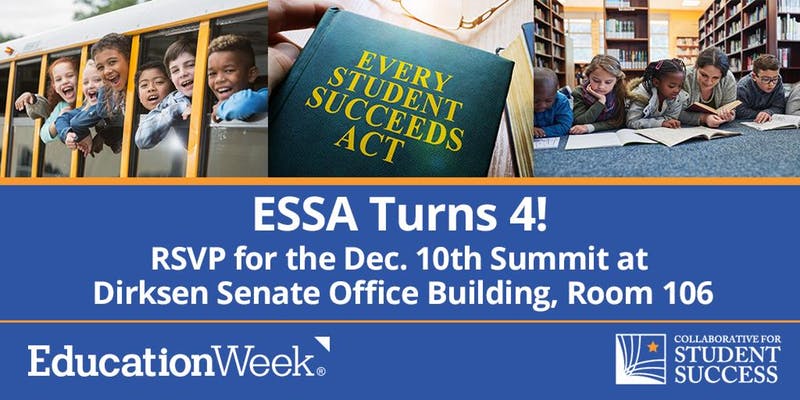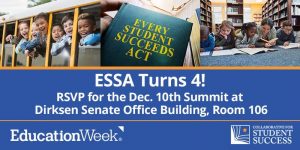
03 Dec ESSA turns 4!
By Dale Chu

Four years ago this month, the Every Student Succeeds Act (ESSA) was signed into law. To mark the anniversary, the Collaborative for Student Success is hosting an event on December 10th at the Dirksen Senate Office Building in Washington, D.C. The afternoon event will include remarks from some of ESSA’s congressional authors, and feature a series of focused discussions related to the implementation of the law four years after its passage.
One of these discussions is the current and future state of state assessments. For all of the additional flexibility provided to states as a result of ESSA, the law largely kept federal testing requirements in place: Schools still must annually test their students in grades 3-8 and once in high school, and they still must find ways to provide modified and alternate assessments for their students with special needs. This has been a source of frustration for some, especially those who believe the next reauthorization of the federal education law should eliminate the annual testing requirement.
Here at Testing-1-2-3, I’ve offered some thoughts on the realities and possibilities with state assessments, and I’ve interviewed some really smart folks on what all of this might mean. Suffice it to say, assessment remains a richly complex and hotly debated topic. From the federal pilot to the ongoing testing churn, there’s no shortage of assessment news. In addition, the use of diagnostic tests—which ESSA was largely silent on—has emerged as a key instructional improvement lever that states are taking a newfound interest in. But how do we make sense of all of it, especially when the enthusiasm for standardized testing continues to wane? What are the implications in states for our country’s most marginalized student groups? And what could the next generation of assessment really look like?
To try and get some clarity, I’ll set the stage on December 10th for an in-depth conversation on testing—moderated by Education Week’s Evie Blad—with two leaders in this space: North Dakota’s state schools superintendent Kirsten Baesler and New Mexico Kids CAN’s Amanda Aragon. The panel discussion will be followed by presentations from NWEA’s Chris Minnich, Curriculum Associates’ Rob Waldron, and Cognia’s Stephen Murray. I’ll also plan on sharing some thoughts afterwards here in these pages, but if you can make it to D.C., I invite you to join us.
You can register for this special (and free!) event by clicking here.


No Comments